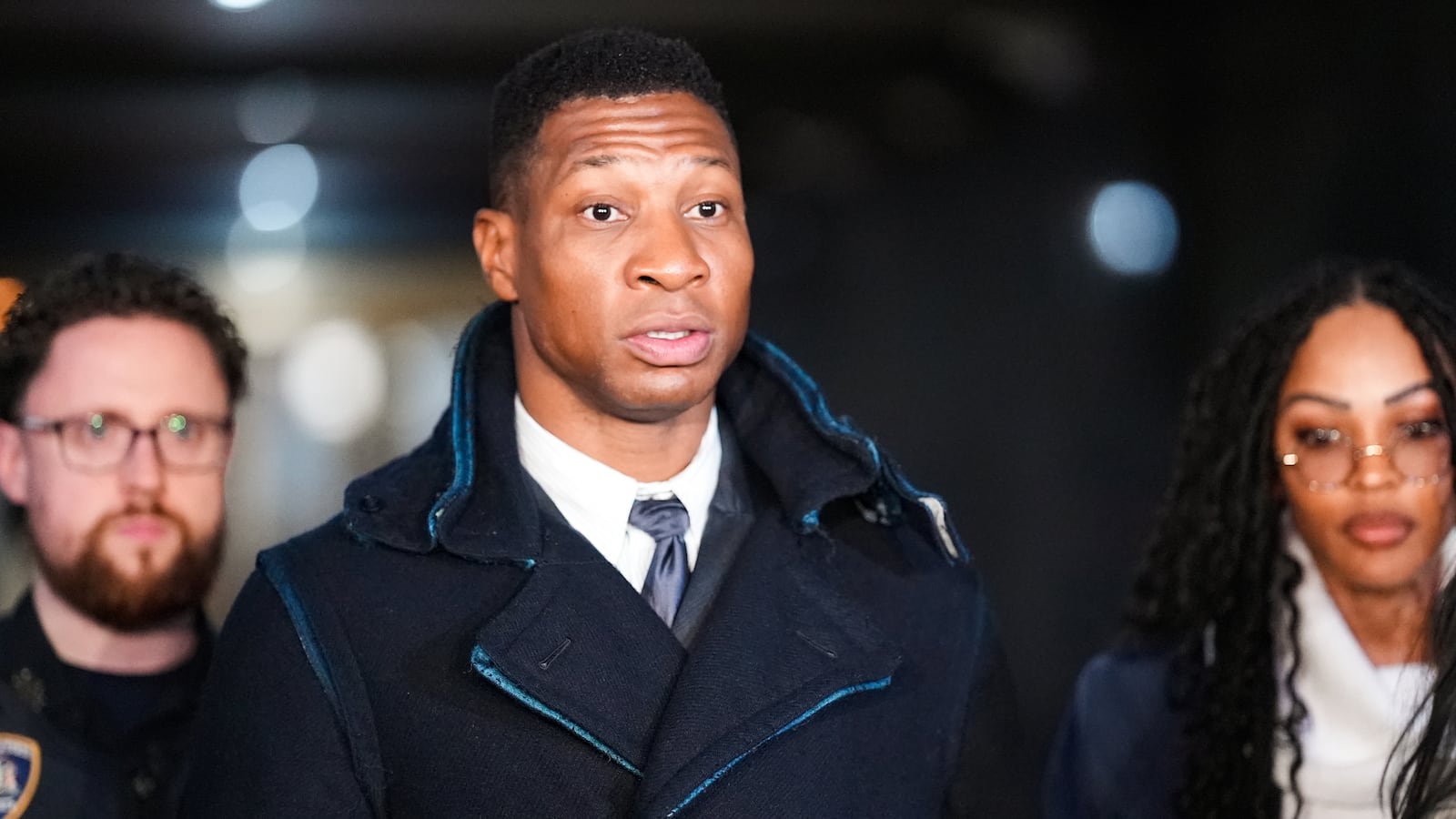Actor Jonathan Majors was sentenced to a year of domestic violence counseling on Monday for attacking his then-girlfriend in the back of a chauffeured car in New York City last year.
Majors, 34, was convicted in December of misdemeanor third-degree reckless assault and a non-criminal harassment charge in connection with the March 25 incident with his former girlfriend, Grace Jabbari. He faced up to a year of prison time for the conviction, but was ultimately sentenced to probation.
The sentencing marks the latest hit against Majors, who was on the verge of superstardom after landing several blockbuster roles at the start of 2023, including a Marvel movie. After his March arrest, Majors’ management and PR teams dropped him, and Marvel Studios parted ways with the actor who played Kang the Conqueror in the Marvel Cinematic Universe.
Last month, Jabbari filed a federal civil lawsuit against Majors for defamation, battery, and abuse. In the lawsuit, Jabbari alleged that Majors portrayed her as a “crazy liar” as he battled the 2023 assault charges. “Put bluntly, Majors’ defense to Grace’s descriptions of the numerous acts of violence Majors perpetrated against her was to brazenly defame her and label her a liar on all claims,” the lawsuit alleges.
“When I was with him, I became a different version of myself,” Jabbari told Judge Michael Gaffey in her brief victim impact statement in court. “I was small scared and vulnerable, yet held very tightly in the palm of his abusive hand, his emotional and psychological abuse was just as damaging.”
“He has not accepted responsibility and he will do this again. He will hurt other women…this is a man who thinks he is above the law,” she added.
Majors, wearing a black-and-white coat, entered the courtroom with a Bible and declined to make a statement on his behalf.
Ross Kramer, one of Jabbari’s lawyers and director of the Incarcerated Gender Violence Survivors Initiative, told The Daily Beast that Majors’ sentencing “appropriate because this was a very serious crime.”
“As Grace Jabbari said in Court today, she is still feeling the effects of the defendant’s actions. This is the norm: the impact of domestic violence often lasts far beyond the end of the relationship,” Kramer said. “What Grace Jabbari did over the past year was incredibly brave, and important. She overcame every obstacle put in her path to give honest, emotional, public testimony, in a court very far from her home. Grace demonstrated that justice can be served in cases like this. ”
Throughout the nine-day trial in Manhattan Criminal Court, prosecutors alleged Majors engaged in a “cruel and manipulative pattern of abuse” against Jabbari during their two-year relationship. That abuse allegedly culminated in the March incident that began as the couple was headed home from a night out in Brooklyn.
On the stand, Jabbari said that she tried to take Majors’ phone after she saw a conversation between her then-boyfriend and someone named “Cleopatra.” She said that Majors texted a link to the 1995 D’Angelo song, “Lady,” and in response, “Cleopatra” said, “Oh, how I wish to be kissing you.”
Jabbari testified that Majors threw himself on top of her after she snatched the phone before grabbing her arm and forcing it behind her back. “He was trying to hurt me,” Jabbari said on the stand.
The driver of the car testified that Majors was “not doing anything” and Jabbari was “doing everything.” Majors’ defense team also argued during the trial that Jabbari was the true aggressor in the altercation.
After the initial incident, surveillance footage played in court showed Majors at one point getting out of the car to escape Jabbari. In the video, Majors is also seen shoving Jabbari back into the Escalade before he runs away. Jabbari is seen running after him.
The pair briefly chatted again before ultimately going their separate ways for the night. Jabbari said she went to a party with some strangers who had helped her, while Majors went to a Manhattan hotel.
Hours later, she said, she left the bar to head home and noticed Majors had sent her a break-up text. The two talked on the phone briefly before Jabbari took two over-the-counter sleeping pills and went to sleep, she said.
Jabbari said she woke up later and eventually fell asleep on the floor near the bathroom from exhaustion. Majors returned to the apartment the next morning, found Jabbari, and called 911. Jabbari testified that she was initially cagey with police about what happened out of Majors’ safety and being overwhelmed by officers at her home.
“I think just things he had told me in the past about not trusting the police and what they would do to him as a black man, and I didn’t want to put him in that situation,” Jabbari said. “I wanted to say, ‘Help me, please.’”
Even at the hospital, she said, she did not tell the full story as doctors examined her fractured finger and injured ear. Jabbari said she learned of Majors’ arrest while she was at the hospital, where she cleared a psych exam.
Majors, however, has firmly maintained his innocence. In an ABC interview after his conviction, Majors said he was shocked by the guilty verdict, which he plans to appeal. While he said that he had been “reckless” with Jabbari’s heart, he insisted that has never hit a woman.
“I shouldn’t have been in the car,” Majors said after he was asked if he felt responsible for any of Jabbari’s injuries. “I shouldn’t have stepped out of the relationship. I shouldn’t have been in the relationship.”






